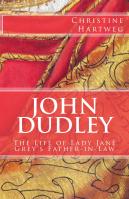The trial for treason of John Dudley, Duke of Northumberland, took place on 18 August 1553 at Westminster Hall. The Spanish merchant Antonio de Guaras may have been an eyewitness. Guaras lived in London and “spoke good English” according to the so-called Spanish Chronicle written by an unknown mercenary soldier where Guaras makes an appearance. Guaras’ own “narration” of the accession of Queen Mary was finished within weeks of the events in the summer of 1553. He dedicated his account to the Duke of Albuquerque, his Spanish patron who had visited England in 1544, under Henry VIII.
Afterwards, on the eighteenth of this month of August, the Duke of Northumberland was brought to trial, and as your Lordship knows, these proceedings are here conducted with great dignity. A stage was erected in the great hall of Westminster, very majestic and richly tapestried, and in the midst of it a rich canopy, and under this a bench with rich cushions, and carpets at its foot: and the commissioners in the cause coming with their maces and officers took their seats as managers for the Queen. And first upon the said bench was seated the aforesaid Duke of Norfolk, who presided for that day for the Queen’s person, and he held in his hand a long white wand, being the ensign of the Lord High Marshal, which office from ancient times the sovereigns have reserved for themselves; and on either side of the bench were seated the peers of the realm, who were named to be judges between the Queen and the delinquent, according to the law. And these same judges, or the most of them, were those whom Northumberland had left in the Tower with Lady Jane. And immediately it was commanded that the prisoner should be produced, and so the Duke of Northumberland was brought forth, who, making three reverences down to the ground before coming to the place where he had to stand, came with a good and intrepid countenance, full of humility and gravity.
The said Duke of Norfolk, whom he had kept in confinement for so many years, and all the other nobles present at the trial, whom a few days ago he had commanded at his leisure, beheld him with a severe aspect, and the greatest courtesy shown him of any was a slight touch of the cap. And forthwith three accusations of treason were brought against him. The first, if it was true that on the eighteenth of July and afterwards he was found in the field with an armed levy against the Queen’s majesty, her Highness having been proclaimed Queen the same day in London and throughout the kingdom. The second, whether he had caused himself to be proclaimed Captain General of the Kingdom. The third, if in the field he had proclaimed Jane Queen and the Queen’s majesty a rebel and a bastard. And if he had denied it, there were present, as has been said, twelve peers empanelled, in conformity with the law of this realm, to judge him after he should have been convicted by the witnesses who should be summoned. To all which the said Northumberland answered that it was the truth, and that he confessed, and that he stood condemned by the law; and out of compassion at beholding him in the misery into which he had brought himself by the ambition of reigning, and all grieving for their own sakes for the stain they had contracted by the offence they had committed against the Queen by consenting to his treason, even though by constraint, as has been said, many of those present could not refrain from tears.
And as he acknowledged his offence, the verdict of the twelve peers was not delivered, according to the law. He implored all that they would beseech the Queen’s majesty not to think upon his iniquities, but upon her exceeding clemency, though saying that he knew his offence to be so grievous that he deserved no mercy. He requested that two or three of the Council would come to confer with him in prison upon important secrets, which greatly imported her Highness’s service. He besought her Highness to grant him four or five days for the things which concerned his soul, which was allowed. He was condemned according to the law to be drawn on a sledge and hanged, and before he was dead to be drawn and quartered, and his heart and entrails cast into the fire. The same day the Marquis of Northampton, and the Earl of Warwick, Northumberland’s son and heir, were condemned in like manner. And the next day Northumberland’s brother, and the Captain of the King’s Guard and Vice-Chamberlain, who was named Sir John Gates, and Sir Thomas Palmer, and Sir Harry Gates, brother of the Vice-Chamberlain, were brought to trial, all of whom confessed and were condemned like the others.
Antonio de Guaras: The Accession of Queen Mary. (edited by Richard Garnett, 1892).


